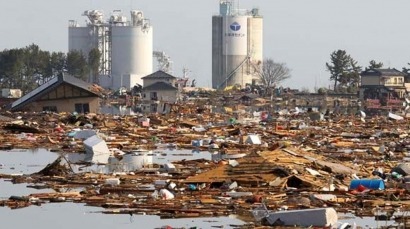
This morning we heard from Yurika Fujimoto, of the Mitsubishi Electric Corporation, who reported that both the company’s PV cell factory, located in the southern part of Nagano Prefecture, and its PV module factory, located in Kyoto, were quite far from the epicentre of the quake.
“No significant injuries among employees or damages to manufacturing facilities have been reported in these factories,” Fujimoto said.
Mitsubishi was not as fortunate in two of its other business divisions.
Its two major business operations in the Tohoku region sustained significant damage as a result the quake – which in Japan is referred to as the Tohoku Pacific Earthquake – but, happily, it reports, it has heard of no significant injuries among employees there.
At Mitsubishi Electric's Tohoku branch, located in Sendai, Miyagi Prefecture, there was some damage in the office. T Fujimoto said the company is employing all possible resources to maintain the functionality of its operations at this branch.
Meanwhile, at Mitsubishi Electric's Koriyama Factory, located in Koriyama, Fukushima Prefecture, some damage was reported to the buildings.
Production has temporarily ceased at this factory, which manufactures CCTVs and communications equipment.
Upon confirming operational safety, Mitsubishi Electric will consider when to resume operations, while taking into account the impact of the earthquake on its manufacturing facilities, Fujimoto said.
Six days after the earthquake, Solar Frontier continues to focus on the safety of employees, continuing operations normally at each of our facilities, and supporting the relief effort.
A company task force for rapid response continues to monitor changing conditions across the country and offer up-to-the-hour assessments of all aspects of its operations.
While operations at the company’s factories remain normal, its research and development operations at its Atsugi Research Centre is being impacted the scheduled, rolling blackouts intended to conserve power.
However, Solar Frontier reported that this has caused only minimal delays to ongoing research and has no direct impact on commercial operations.
So far, the company said, its export logistics have not been affected by the quake and its aftermath. Inside Japan, though, it said customers nearest to the affected areas have been informed about delays in delivery due to power shortages and disruption to transportation infrastructure. Also, significant shipping of relief supplies to the area now takes priority.
As for direct impacts from the nuclear power issues at Fukushima, Solar Frontier’s factories receive power from the Kyushu grid, which is separate from the Tokyo Electric Power (TEPCO) grid where the breakdowns have occurred.
Solar Frontier’s headquarters and factories are quite far from the Fukushima nuclear plants, making it less likely that the health of employees will be affected by the ongoing issues there.
But the company said it is prepared to operate the headquarters operations under a heightened emergency situation.
“Solar Frontier remains alert and prepared for any changes in the situation that warrant preventive action or protective reaction,” the company said.
REM also heard today from Akiko Chujo, of the Kyocera Corporation.
As regards large scale operations (projects over 1 MW), Kyocera is supplying solar modules to the Tohoku electric company and the Tokyo electric company, and both solar projects are under construction.
“We are investigating other small solar systems installed on the buildings and houses now, but due to the deadly damage by Tsunami it might take a long time to grasp the situation,” Chujo said.
For additional information:

